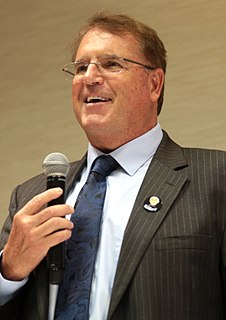A Quote by Thomas DiLorenzo
It is no coincidence that some of America's most lethargic industries-steel, footwear, rubber, textiles-are also among the most heavily protected.
Related Quotes
U.S. industries from steel-making to plastics synthesis are among the world's most energy-efficient; American agriculture is highly productive, as are America's railroads. But for decades, Americans themselves have been living beyond their means, wasting energy in their houses and cars and amassing energy-intensive throwaway products on credit.
Throughout human history, people have developed strong loyalties to traditions, rituals, and symbols. In the most effective organizations, they are not only respected but celebrated. It is no coincidence that the most highly admired corporations are also among the most profitable. Why? Because everyone involved is committed to certain non-negotiable core values. Traditions keep them alive. Rituals such as special occasions reaffirm them. Symbols serve as constant reminders of their enduring importance.
Along with church monies and the United Way, most of the others that I give the most to are organizations for which I have some personal connection in that they have affected family members; i.e., kidney, cancer, heart, and organ donation. My wife and I have also contributed to and been heavily involved with the Boys and Girls Club of Utah County.
I think the Tata Group's greatest contribution to the growth of the Indian economy and Indian industry probably happened in the pre-independence era. The Group's investments in industries such as steel, textiles, power and hotels were certainly driven by an entrepreneurial spirit, but they were driven even more, I think, by a desire to make India self-sufficient and independent of its colonial masters then.
The strange thing about my life is that I came to America at about the time when racial attitudes were changing. This was a big help to me. Also, the people who were most cruel to me when I first came to America were black Americans. They made absolute fun of the way I talked, the way I dressed. I couldn't dance. The people who were most kind and loving to me were white people. So what can one make of that? Perhaps it was a coincidence that all the people who found me strange were black and all the people who didn't were white.
For the three decades after WWII, incomes grew at about 3 percent a year for people up and down the income ladder, but since then most income growth has occurred among the top quintile. And among that group, most of the income growth has occurred among the top 5 percent. The pattern repeats itself all the way up. Most of the growth among the top 5 percent has been among the top 1 percent, and most of the growth among that group has been among the top one-tenth of one percent.
Automobile in America,Chromium steel in America,Wire-spoke wheel in America,Very big deal in America!Immigrant goes to America,Many hellos in America,Nobody knows in America,Puerto Rico's in America!I like the shores of America!Comfort is yours in America!Knobs on the doors in America!Wall-to-wall floors in America!
Let's take energy, for instance. I understand that in some industries, the input cost of energy is a major factor in whether an industry is going to locate in the United States or go elsewhere. So, when, at Bain Capital, we started a new steel company called Steel Dynamics in Indiana, the cost of energy was a very important factor to the success of that enterprise.
































